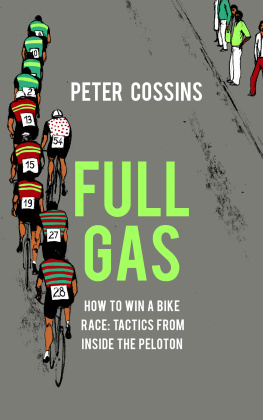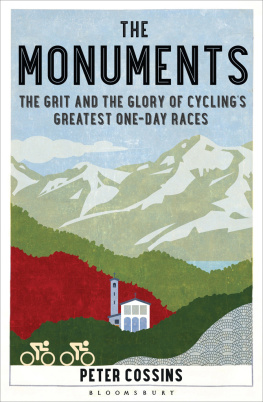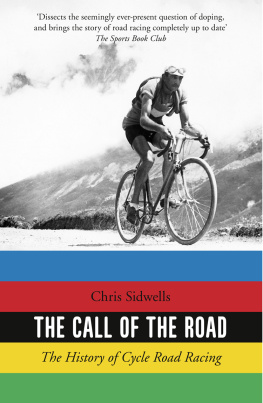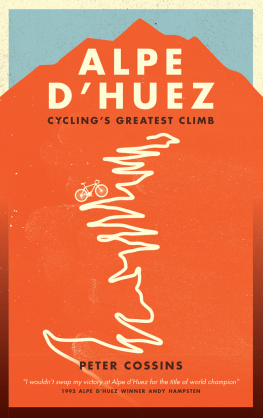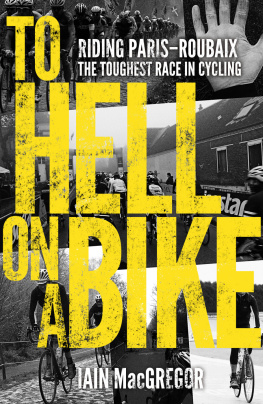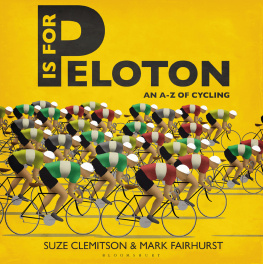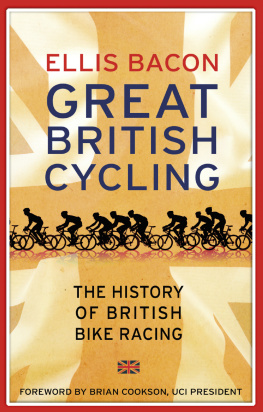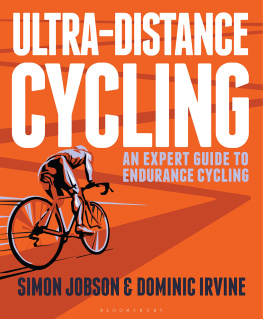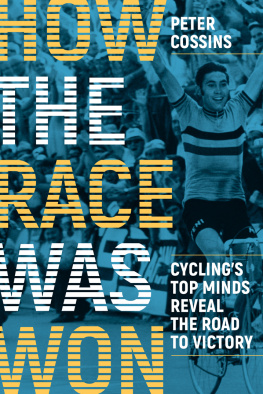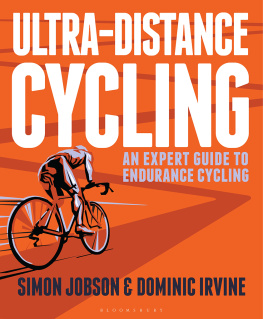CONTENTS
ABOUT THE BOOK
Riding as fast as you could for as long as you could was the main tactic in the early days of road racing when Grand Tours could be won by hours. Now a minutes delay thanks to a puncture could ruin a riders chances over a three-week race and the sport is described as nothing less than chess on wheels. The intricacies and complexities of cycling are what makes it so appealing: an eye for opportunity and a quick mind are just as crucial to success as a big engine or good form.
So how do you win a bike race? How do you cope with crosswinds, cobbles, elbows-out sprints, weaving your way through a teeming peloton? Why are steady nerves one of the best weapons in a riders arsenal and breakaway artists to be revered? Where do you see the finest showcase of tactical brilliance? Peter Cossins takes us on to the team buses to hear pro cyclists and directeurs sportifs explain their tactics: when it went right, when they got it wrong from sprinting to summits, from breakaways to bluffing.
Hectic, thrilling, but sometimes impenetrable watching a bike race can baffle as much as entertain. Full Gas is the essential guide to make sense of all things peloton.
ABOUT THE AUTHOR
First drawn into the sport while a student in Spain in the mid-1980s, Peter Cossins has been writing about cycling since 1993, contributing principally to Cycling Weekly, Cycle Sport and Procycling. The Monuments, his history of cyclings five greatest one-day Classic races, was published in 2014, followed in 2015 by Alpe dHuez, an appraisal of cyclings greatest climb. He lives in the Arige in the heart of the French Pyrenees.
ALSO BY PETER COSSINS
Butcher, Blacksmith, Acrobat, Sweep: The Tale of the First Tour de France
The Monuments: The Grit and Glory of Cyclings Greatest One-Day Races
Alpe dHuez: The Story of Pro Cyclings Greatest Climb Ultimate tapes: Ride Europes Greatest Cycling Stages Everybodys Friend: The Life and Career of Dave Rayner 19671994 and His Legacy to Cycling
To Anabel Hernndez, an inspiration as a journalist and writer
PROLOGUE
Cycling is a living, breathing art. Those cyclists who forget that are halfway to becoming sloths
Laurent Fignon, We Were Young and Carefree
Its late on a baking mid-August afternoon in the French city of Nmes, which is hosting the start of the 2017 edition of the Vuelta a Espaa. Team buses and trucks are lined out beneath the trees flanking the citys main boulevard on the western side of the old town, famed for its Roman amphitheatre. Next to some, mechanics are carrying out final checks on equipment, while others provide shelter for riders warming up on stationary turbo trainers for the team time trial that will provide the first test at what is one of cyclings three Grand Tours, alongside the Giro dItalia and the Tour de France.
With the final reconnaissance of the route already done and an hour until the start, theres not much for team directors to do except soak up the Midi sun. Wandering through the crowds, I spot Patrick Lefevere sitting in a deck chair doing exactly this outside the bus of the Quick-Step Floors team he has managed under different sponsors for almost thirty years. The silver-haired Belgian is famed for his tactical acuity.
Excuse me, Patrick. Do you mind if I ask you a few questions?
What about?
Im writing a book about tactics in cycling
Hah! Good luck!
Lefeveres booming voice, as deep but not as sonorous as that of Johnny Cash, almost knocks me back and draws the attention of the Quick-Step mechanics and soigneurs, who turn and stare. What have I done to provoke their boss? theyre wondering. And Im thinking the same.
Lefevere pulls off his mirror shades and looks at me for a few moments, his stare as glaring as the sun. He then points to his right, towards the bike stands and pressure washers where his mechanics have been working.
See that chair over there. Bring it over here next to me. Lets talk .. .
Bike racing has been described by American writer Owen Mulholland as chess at 150 heartbeats a minute, the depiction neatly combining the strategic complexity of trying to outwit 200 other riders when the messages your brain is receiving from every part of your body are telling it slow down! Yet, talk to the riders who battle each other within the peloton, that wonderfully seething mass of mayhem that is so mesmerising when seen from the TV helicopters, and to the team directors who are lined out in convoy behind them, and the comparison is more often made to poker. Bike racing is all about bluffing, about hiding what youve got in your legs and what card your team is planning to play, about alliances that come together in an instant and are dissolved just as quickly, about keeping your rivals guessing. In the Netherlands, long one of cyclings heartlands, they have a saying that encapsulates it perfectly: First eat whats on your neighbours plate, then start on your own plate.
Fundamentally, road racing is a very simple sport. Once the riders are waved away, there are essentially just three different scenarios that can be acted out: a small group of riders escapes and end up deciding the days spoils between them; that small group is reeled in before the finish and the best sprinters in the bunch decide matters between them; or the break goes clear but is chased by the teams of the strongest riders, who then dispute the finish between them on a climb.
Its complexity derives from each of as many as twenty-two teams beginning the race with a specific strategic objective, which might be as straightforward as ensuring one of their riders is in that break, or more far-reaching with the stage victory or the leaders jersey as their ultimate goal. Once the race referee has signalled the start of racing, the twenty-two tactical plans, which will have been agreed on just a few minutes earlier at the briefings held behind the tinted windows of luxury team buses, start to impact on each other like water molecules bouncing around a saucepan over a flame. That there will be a result is inevitable. But what happens in between that flag being dropped and the finish-line banner cannot be predicted and can be totally incomprehensible, especially to the occasional fan but even to someone like me who has spent a quarter of a century watching and writing about bike racing.
In an attempt to better understand and explain the constantly evolving and frequently quite exquisite tactical puzzles that every bike race sets and every rider within it contributes to, Ive spent a season watching races with a different perspective, focusing more on the various processes that lead to a rider winning a race, and less on the finale and the words and personality of the winner. It has been enlightening and captivating. In doing so, Ive fallen back in love with the sport that drew me in during the early 1980s, and much more passionately than before. Indeed, I confess that Ive discovered the full scope of its beauty for the first time.
The result is Full Gas, an explanation of the how and why of bike tactics. It delves into the sports history to understand where tactical thinking began and to highlight its development over a century and more. More than anything, though,

